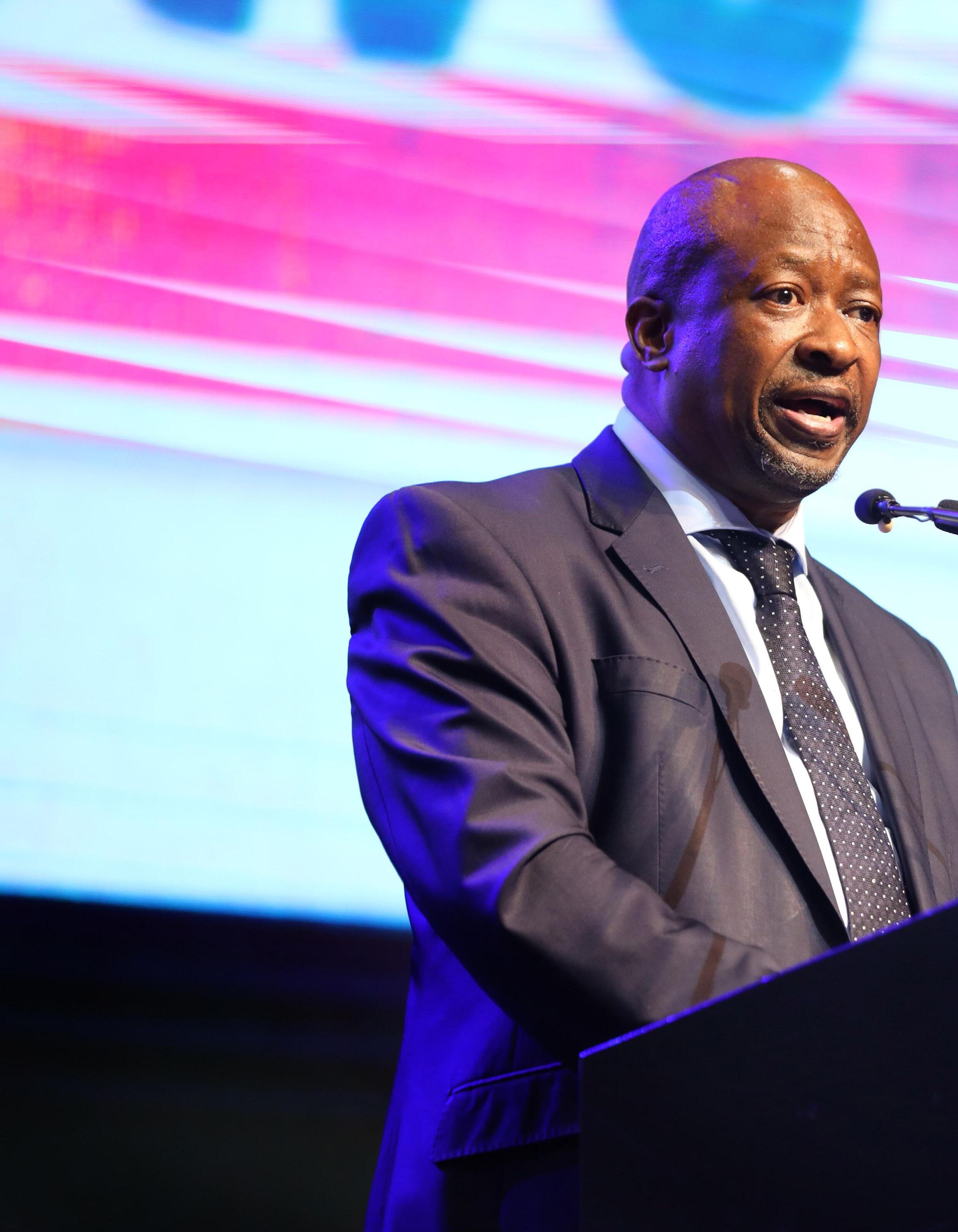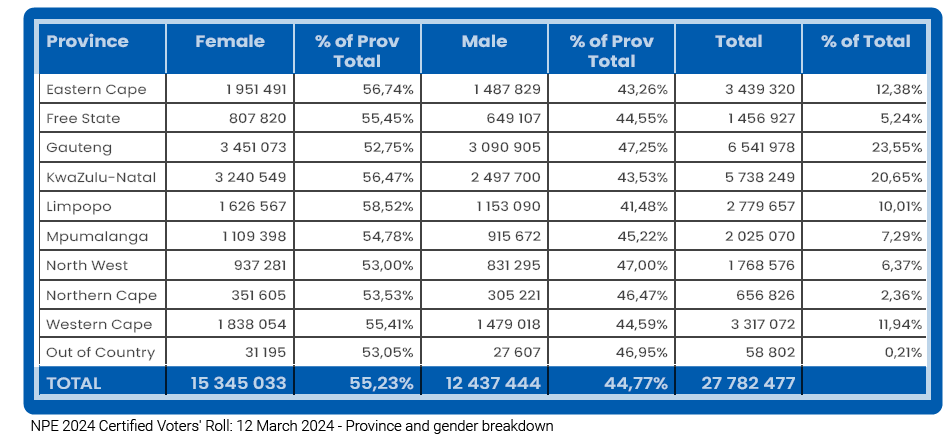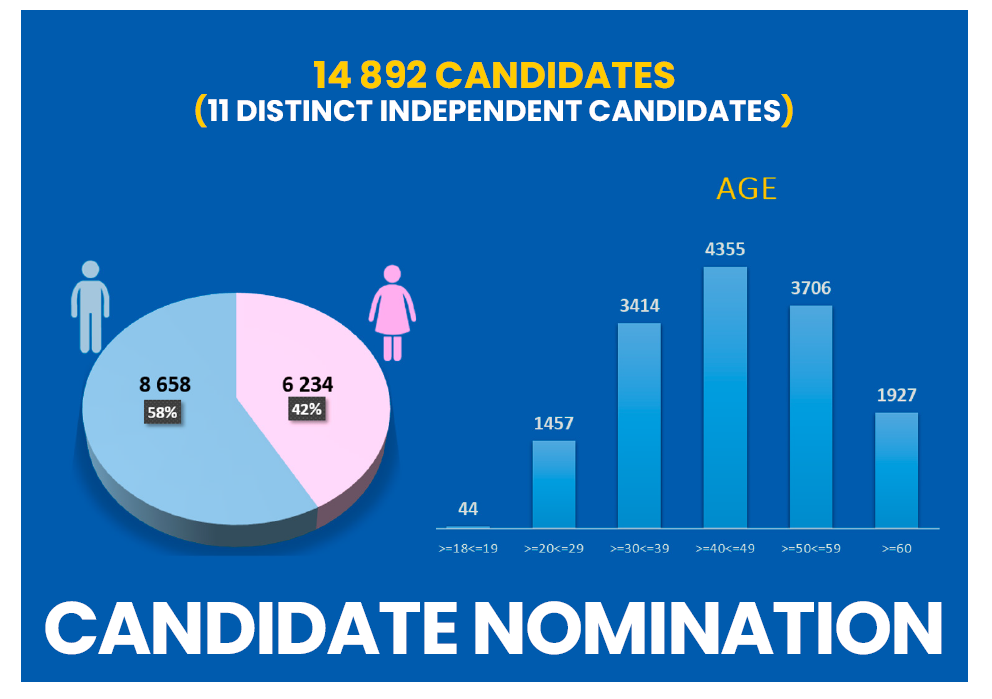
10 minute read
ELECTORAL COMMISSION
Set for 29 May, the 2024 National and Provincial Elections mark South Africa’s seventh democratic election since the end of apartheid in 1994. Chief Electoral Officer Sy Mamabolo emphasises the Electoral Commission’s readiness amidst commemorations of 30 years of democracy.
ELECTORAL COMMISSION GEARED UP FOR 2024 ELECTIONS
As the calendar inches closer to the pivotal election dates, the buzz surrounding democratic processes grows louder. Elections serve as the cornerstone of democracy, where the collective voices of citizens resonate in the ballot boxes, shaping the trajectory of nations and communities.
However, behind the scenes, meticulous preparation is under way to ensure that the democratic machinery operates seamlessly on the designated day.
The 2024 General Elections will be held on 29 May to elect a new National Assembly as well as the provincial legislature in each province.
In his address at the National Pledge Signing Ceremony for the Electoral Code of Conduct, held in Midrand on 4 April 2024, the Electoral Commission’s Chief Electoral Officer (CEO), Mr Sy Mamabolo, said it is vital to reflect on one of its abiding successes as the country commemorates the 30th anniversary of its democracy.
“Today, we stand before South Africa and her people to affirm our readiness to conduct an election which accords with the constitutional yardsticks and international norms. We give this affirmation of readiness, alive to the enormity of the challenge that rests on our hands. We stand ready to assiduously ensure that we do not let the motherland down for otherwise history will have a deleterious account of our charge of this task,” he said.
Following the proclamation of the election date by the President and the provincial premiers, the Electoral Commission published an Election Timetable on 24 February.
The timetable is an important statutory instrument that guides the performance of various election activities. It provides cut-off times for the performance of these important electoral activities. The timetable is a statutory guardrail for the preparations of the elections. It is a guiding light for electoral preparations. Compliance to the provisions and terms of the timetable is not an option but such compliance is peremptory for contestants, voters and the electoral administration itself.
Voters’ Roll
The voters' roll was certified on March 12, 2024, following two rounds of registration weekends and a persistent effort to promote the online registration method. The foundation of a legitimate election is the validation of the voters' roll. Currently, the certified voters’ roll stands at 27.7 million voters. South Africa has not seen this level of
registration since the voters’ roll was first established in 1999. Remarkably, 2.4 million voters have utilised the online registration portal since its inception in July 2021, either to update their registration information or register for the first time. Youth registration is starting to show some early indications of improvement because of this portal's effectiveness.
Measured against the estimated voting age population, the registration coverage in the 18–19 year-olds stands at 27%, while registration coverage stands at 48.6% among 20–29 year-olds. Coming off a low registration base, the historical under-representation of young persons on the voters’ roll is showing welcome signs of amelioration. There are more female registered voters than there are men: 15.3 million voters are female and 12.4 million male voters. The provinces of Gauteng and KwaZuluNatal jointly account for 44% of voters in the country. Gauteng has 6.5 million voters, while KwaZuluNatal has 5.7 million voters. The province of the Eastern Cape comes in third position with 3.4 million registered voters.
In line with established electoral practice, electronic copies of the
voters’ roll with redacted identity document numbers to align with national frameworks for protection of personal information have been advanced to participating contestants. This will enable contestants to canvass votes, and also enable them to verify the accuracy of the roll.
Election Contestants
On April 12, the Commission issued certificates to 14 889 candidates who will contest 887 seats in the forthcoming elections. Nomination of candidates closed on 8 March 2024 and following processes of verifications and objections 70 political parties, and 11 independent candidates were published as final contestants in these elections.
Fifteen political parties are contesting all tiers of the elections which means the compensatory seats in the National Assembly, the nine province-to-national elections as well as the nine provincial legislatures. A total of 31 political parties will contest the national elections for the first time.
An analysis of the list of candidates reflects that at 58.14% or 8 658, are male, with female candidates at 41,86% or 6 234. Candidates in the age category 40-49 are the majority at 4 361, followed by the 3 708 in the 50-59 age category and the 3 406 in the 30-39 age group. Voters who are over 60 stands at 1 924 and those between the ages of 18-29 are 1 493.


Notably, there are 15 candidates who at 18 years are also first-time voters. Of the 15, nine are female and six are male. These candidates are spread across eight political parties. There are 17 candidates who are aged 80 years and more. The majority 16 are male candid ates standing for four political parties leaving only one female candidate in the age category. On gender representation, 15 political parties have a female representation of 50% and above. Seven parties achieved a 40% and a further 14 parties have a 30% female representation on their lists.
Voting Station Network
Turning to voting stations, in line with the provisions of the Election Timetable, the Commission published the list of all voting stations and their locations on 12 May 2024. The Commission has grown the network of voting stations to 23 292, and is committed to providing a consistent service to voters at all these voting stations. This includes 954 temporary voting facilities where physical infrastructure is not available.
An election is obviously a logistical undertaking of serious proportions. Over 95% of logistical supplies for election day are already at hand, and the Commission in the process of distributing 1 873 tonnes of material between its different warehouse and storage facilities across the country.
With the voters’ roll certified, the Electoral Commission’s education efforts now turn to balloting education, both on traditional and digital channels, and through face-toface interactions in communities at a ward level. That is, presenting the three ballots to be used in the election and what each of these represents and the eventual translation of valid votes to seats in the ten legislative assemblies.
It would be remiss not to mention social media because a significant proportion of the electorate receive news and engages politically and socially on social media platforms. These therefore form part of the mix of platforms to provide voter education and importantly to animate registered voters to vote on 29 May.
Special Votes
“A credible electoral framework must make provision for those who are in special circumstances.
The Commission reminds South Africans that there are two categories of special votes affected by this deadline” Mr Mamabolo said. The first category relates to home visits for those registered voters who are infirm or have impaired mobility.
Such voters may apply to be visited at home or a place of confinement. The second category of special votes is available to any registered voter who wishes to vote early at their voting station. There is no automatic agebased qualification for a special vote. Special votes are available to all voters, but only upon application by the deadline date of 3 May 2024.
Citizens voting out-of-country
As matters stand, over 78 000 voters have registered on the international segment of the voters’ roll or indicated that they will be voting out-of-country. These voters will be provided for at the diplomatic missions of registration.
Citizens voting out-of-country will be able to vote in the national election at their mission as follows:
• Algiers, Amman, Cairo, Damascus, Jeddah, Kuwait City, Ramallah, Riyadh, and Tehran will vote on Friday, 17 May 2024 between 07h00-19h00.
• The rest of the 102 missions listed in the schedule attached and on the website will be open for special votes on Saturday, 18 May 2024, between 07h00 and 19h00.
• In respect of the mission in the United Kingdom, the Commission has determined two days of special voting. These are Saturday 18 and Sunday 19 May 2024 from 07h00-21h00. The additional special voting day and extended voting hours are intended to enable proper arrangements for
the 24 535 voters entitled to vote at the mission. Similarly, extended voting hours have been prescribed for the missions in Washington DC and New York. The voting hours are 07h00-21h00.
The 10 largest international voting stations by voting population are London (24 535 eligible voters), The Hague (6 659), Canberra (3 674), Dubai (3 266), Dublin (3 040) Wellington (2 292), Abu Dhabi (1 825), New York (1 799), Washington DC (1 799) and Berlin (1 478).
In collaboration with the Department of International Relations and Cooperation (DIRCO) the Electoral Commission has begun the process of shipping voting materials including, voting booths, ballot boxes, ballot papers, stationery packs, and the relevant lists of approved voters, to the 111 South African missions across the world.
Furthermore, voters who will be outside of the voting station of registration do not lose their right to vote. Such voters may still access the voting process by notifying the CEO, in terms of Section 24A of the Electoral Amendment Act, that they will not be at their voting station on election day and where they will be casting their ballots by no later than 17 May 2024.
Visit www.elections.org.za to give a Section 24A notice.

The Commission is in the final stages of training 202 500 voting officials who will administer the electoral process in the voting stations. These staff are being subjected to a hybrid training involving online modules as well as practical modules.
To improve the quality of the counting and the completion of result slips, the Commission is instituting a new category of staff who will support the presiding officer with the counting effort, known as counting officials.
Ensuring Free, Fair and Credible Elections
The CEO called on citizens, members of the media and the leaders of political parties to lead by example, fostering an electoral environment characterised by trust, integrity, and respect for all.
For its part, the Electoral Commission commits itself to pronounce an election outcome rooted in the choices of the South African voters.
“While challenges abound and uncertainties loom, the resilience and determination of our electoral body, policymakers, and citizens alike serve as beacons of hope for the future of democracy. As we stand on the precipice of yet another electoral cycle, let us reaffirm our dedication to upholding the sanctity of the ballot box and ensuring that every voice is heard and every vote counts. It’s your democracy, own it.”

Key election dates: 17-19 May, 7am-7pm Voting out-of-country
27 & 28 May, 9pm-5pm : Special voting in-country
29 May, 7am-9pm: Election day in South Africa
31 May, 5pm: Close of objections
Within 7 days: Announcement of election results











